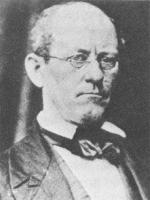 |
| Virginia Governor John Letcher |
Virginia Gov. John Letcher's Conditions for Settlement
| In early January, 1861, Gov. John Letcher called Virginia's legislature into special session to consider, among other things, whether or not to call a secession convention. The Jan. 8 issue of the Richmond Enquirer contained a long speech which Gov. Letcher made to the legislature at the opening of this special session. During this speech Letcher, normally characterized as opposed to secession, gave a list of six conditions which he believed could relieve the growing secession crisis. I am indebted to Steve Miller of the University of Maryland for sending me a photocopy of Letcher's speech, from which this excerpt is taken. |
|
| What, then, is necessary to be done? The
Northern States must strike from their statute books
their personal liberty bills, and fulfill their
consitutional obligations in regard to fugitive slaves
and fugitives from justice. If our slaves escape into
non-slaveholding states, they must be delivered up; if
abandoned, depraved, and desperately wicked men come into
slave States to excite insurrections, or to commit other
crimes against our laws, and escape into free States,
they must be given up for trial and punishment, when
lawfully demanded by the constituted authorities of those
States whose laws have been violated. Second --- We must have proper and effective guarantees for the protection of slavery in the district of Columbia. We can never consent to the abolition of slavery in the district, until Maryland shall emancipate her slaves; and not then, unless it shall be demanded by the citizens of the district. Third --- Our equality in the States and Territories must be fully recognized, and our rights of person and property adequately protected and accured. We must have guarantees that slavery shall not be interdicted in any Territory now belonging to, or which hereafter may be acquired by, the general government; either by the Congress of the United States or by the Territorial Legislature: that we shall be permitted to pass through the free States and Territories without molestation, and if a slave shall be abducted, that the State in which he or she shall be lost, shall pay the full value of such slave to the owner. Fourth --- Like guarantees must be given, that the transmission of slaves between the slaveholding States, either by land or water, shall not be interfered with. Fifth --- The passage and enforcement of rigid laws for the punishment of such persons in the free States as shall organize, or aid and abet in organizing, either by the contribution of money, arms, munitions of war, or in any other mode whatsoever, companies of men, with a view to assail the slaveholding States, and to excite slaves to insurrection. Sixth --- That the general government shall be deprived of the power of appointing to local offices in the slaveholding States, persons who are hostile to their institutions, or inimical to their rights -- the object being to prevent the appointing power from using patronage to sow the seeds of strife and disunion between the slaveholding and non-slaveholding classes in the Southern States. These guarantees can be given without prejudice to the honor or rights, and without a sacrifice of the interest, of either of the non-slaveholding states. We ask nothing, therefore, which is not clearly right and necessary for our protection: And surely, when so much is at stake, it will be freely, cheerfully and promptly assented to. It is the interest of the North and South to preserve the Government from destruction, and they should omit the use of no proper or honorable means to avert so great a calamity. The public safety and welfare demand instant action.
|